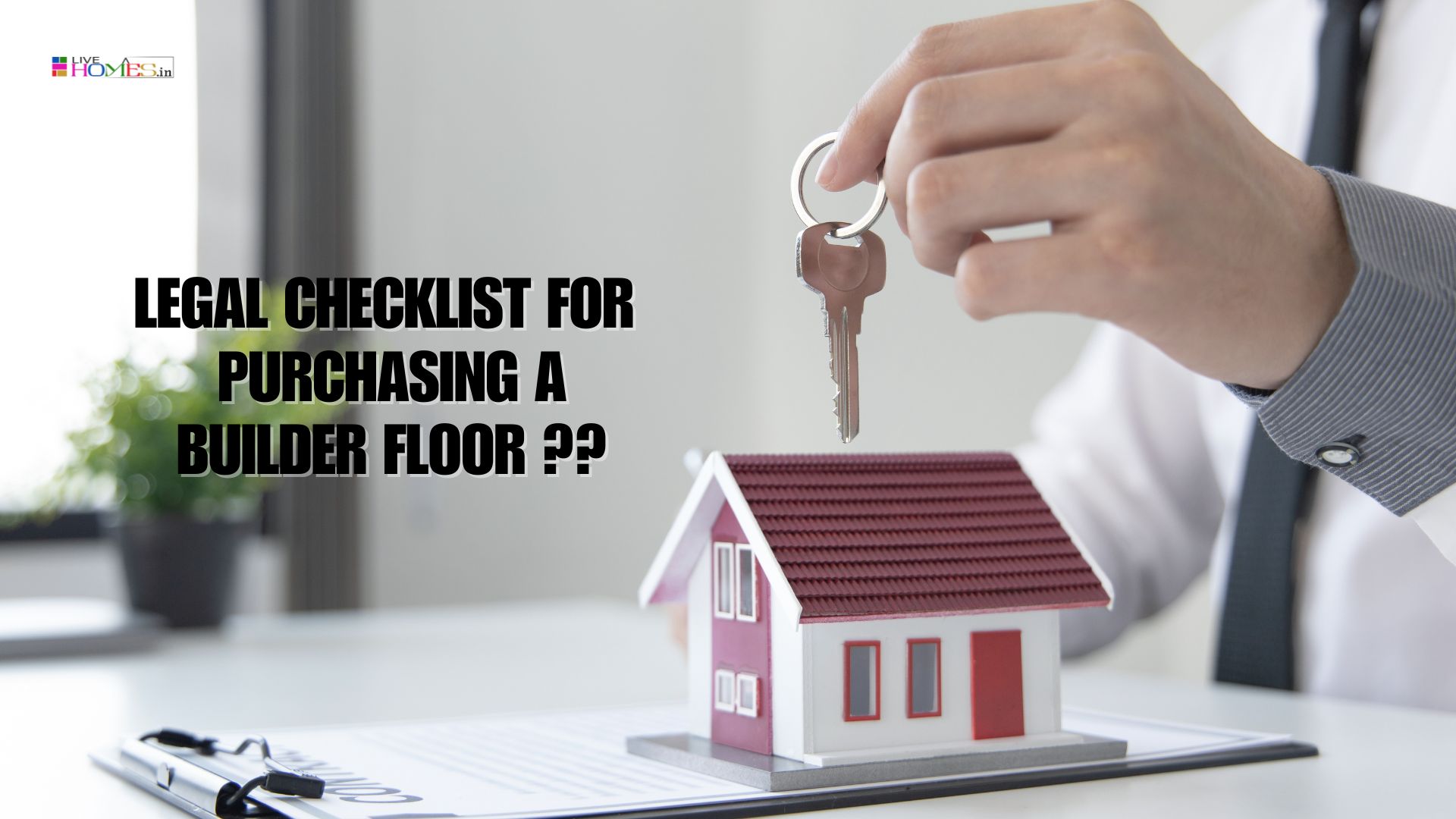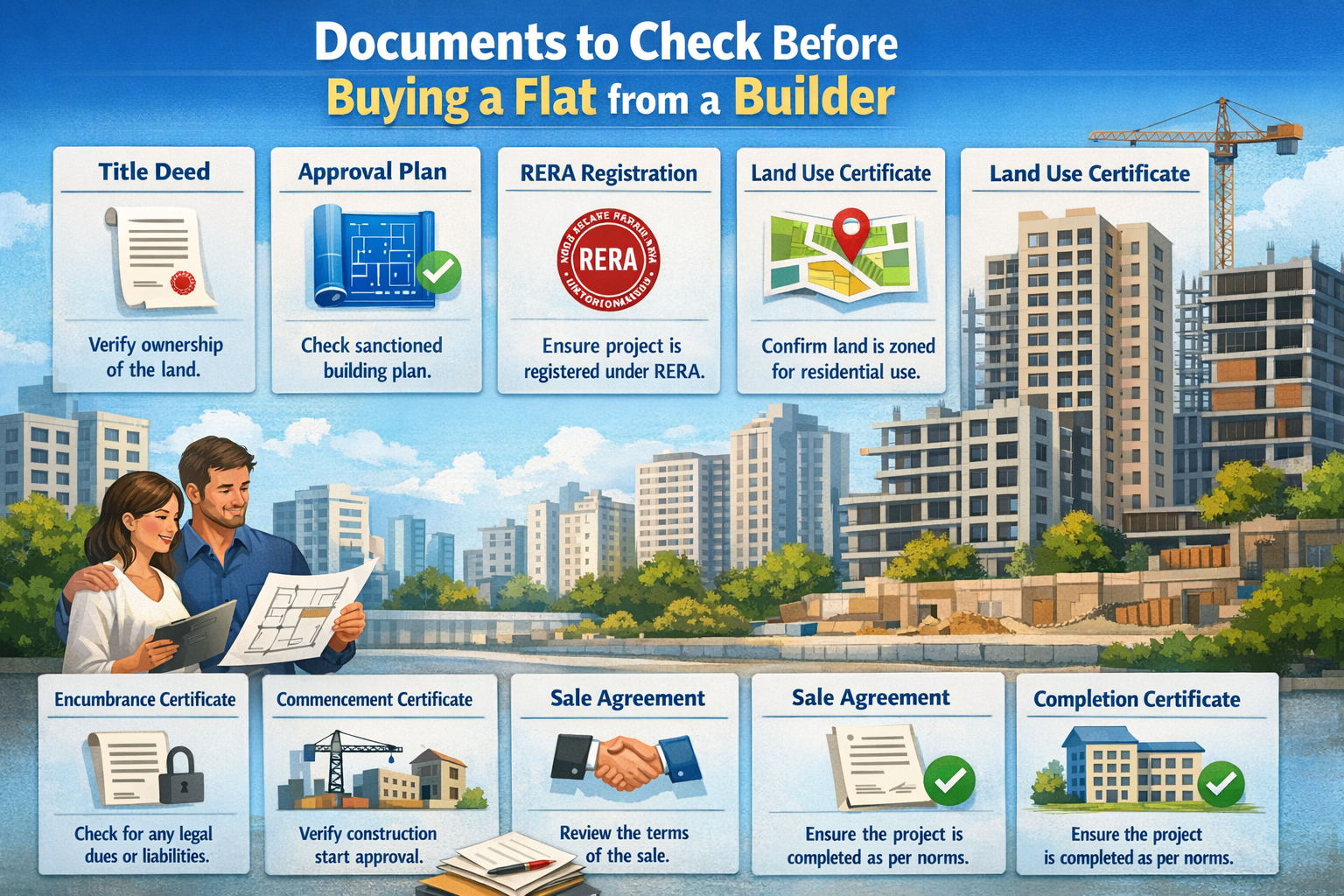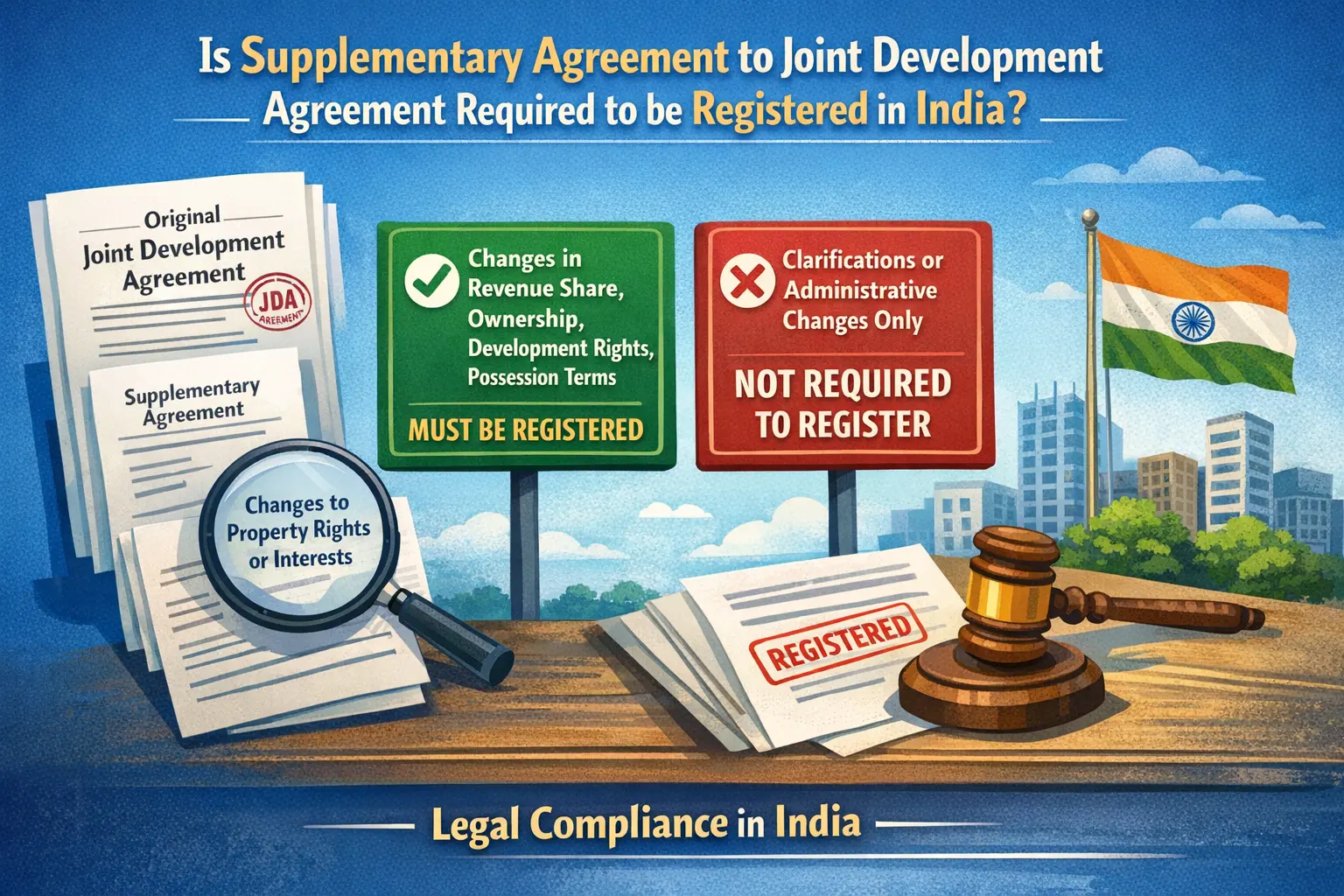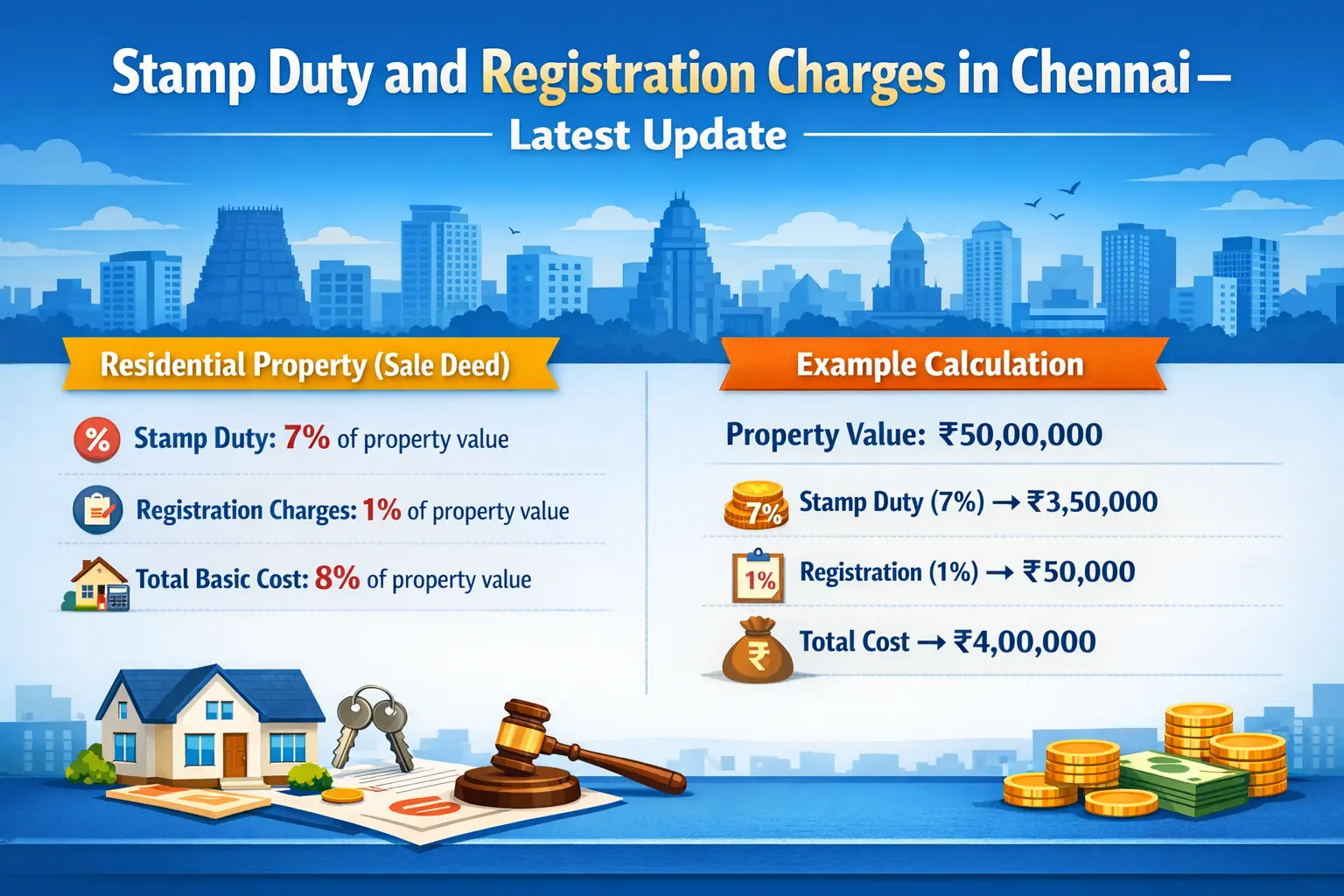Purchasing a builder floor — an independent floor in a low-rise building (typically 2-4 floors), often developed by a builder on a standalone plot — is an attractive option for many homebuyers in India. It offers more privacy than apartments and is often located in prime urban or suburban areas. However, unlike apartment complexes with registered societies, builder floors come with a distinct set of legal and regulatory challenges. To ensure a legally safe and hassle-free transaction, here is a comprehensive legal checklist for purchasing a builder floor, explained in full detail:
1. Title Verification of the Land
Why it matters:
The builder floor is constructed on a piece of land. It’s critical to verify that the builder has a clear and marketable title to the land.
What to check:
- Title Deed: Obtain and examine the original title deed of the land.
- Chain of Title: Check ownership history for at least the past 30 years to identify any disputes or claims.
- Encumbrance Certificate: Obtain this from the sub-registrar office to ensure the land is free of mortgages or loans.
- Mutation Records: Confirm mutation in the builder's name in local municipal records.
Recommended Action:
Hire a real estate lawyer to conduct due diligence and title search.
2. Check Land Use and Zoning Regulations
Why it matters:
Every area is designated for certain land use under the Master Plan or Zonal Plan of the city.
What to check:
- Ensure the land is designated for residential use.
- Check if the building plan conforms to Floor Area Ratio (FAR) or FSI regulations.
Ensure the number of floors is within permissible limits (often 3-4 floors in most municipalities).
3. Building Plan Approval
Why it matters:
Construction must be legal and follow sanctioned plans.
What to check:
- Approved Building Plan from the local development authority/municipal corporation.
- Whether the construction matches the approved plan (no illegal additions).
- Whether the builder has taken Completion Certificate (CC) or Occupancy Certificate (OC) from the authority.
Note:
If OC is not available, you may face issues with electricity/water connection or resale in the future.
4. Verify Builder’s Ownership or Development Rights
Why it matters:
Sometimes, the builder may not own the land but constructs under a collaboration agreement with the landowner.
What to check:
- Joint Development Agreement (JDA) or Collaboration Agreement.
- Power of Attorney (PoA) if the builder is acting on behalf of the landowner.
Ensure these documents are legally registered.
5. Construction Quality & Safety Compliance
Why it matters:
Low-rise builder floors often escape scrutiny by authorities compared to large apartment projects.
What to check:
- Check for structural stability certificate (especially in seismic zones).
- Ensure adherence to building codes and fire safety norms.
- Check quality of materials used — get an independent civil engineer to inspect if possible.
6. Floor-wise Sanction and Division
Why it matters:
Each floor must be clearly demarcated in the sanctioned plan and legally transferable.
What to check:
- Whether the property is being sold floor-wise with individual sub-registrations.
- Ensure clear demarcation of entrance, parking, and common areas.
- This avoids future disputes with other floor owners.
7. Property Tax and Dues Clearance
Why it matters:
Unpaid property tax or utility dues can become a liability for the buyer.
What to check:
- Latest Property Tax Receipts.
- Electricity, water, and sewerage bill clearance.
- No pending dues with the local municipal authority.
8. Legal Registration of the Builder Floor
Why it matters:
Only a legally registered sale deed gives you ownership rights.
What to do:
- Register the Sale Deed at the local Sub-Registrar Office.
- Pay applicable stamp duty and registration charges (varies by state).
- The deed should clearly mention:
- Floor number
- Share in land (if any)
- Common areas (e.g., parking, stairs)
9. RERA Registration (If Applicable)
Why it matters:
Under the Real Estate (Regulation and Development) Act, 2016, projects above a certain size must be registered with RERA.
What to check:
- Visit your state’s RERA portal and check if the project is registered.
- Verify the builder’s credentials, project timelines, and legal status.
Note: In many cases, individual builder floors might be exempt from RERA. However, in larger projects with more than 8 units or over 500 sq.m of area, registration is mandatory.
10. Home Loan Due Diligence
Why it matters:
If you’re taking a home loan, banks do legal checks, but you should still be cautious.
What to do:
- Prefer properties approved by reputed banks.
- Still perform independent legal due diligence.
- Check the loan eligibility of the property — builder floors sometimes face loan restrictions.
11. Society Formation and Common Area Rights
Why it matters:
Since builder floors are not part of large apartment complexes, shared resources and maintenance can be a grey area.
What to ensure:
- Check agreement on common areas like stairs, terrace, parking.
- Ensure rights to use terrace or stilt parking are clearly documented.
- If applicable, check if a Residents’ Welfare Association (RWA) or Co-operative Housing Society is formed.
12. Possession Letter & Occupancy
What to check:
Collect a Possession Letter after full payment.
Ensure the flat is ready for possession — legally and practically.
Prefer possession only after builder obtains Occupancy Certificate.
13. Check for Pending Litigation
Why it matters:
Any court case involving the builder or the land can block your ownership or resale.
What to do:
Do a litigation search in civil courts.
Ask the builder to give a declaration of no litigation.
14. Indemnity and No-Objection Certificates (NOCs)
Why it matters:
These safeguard you from third-party claims or future disputes.
What to collect:
- NOC from local authorities (Water, Electricity, Fire, Environment).
- Indemnity bond from the builder against any legal dispute or defect in title.
15. Resale / Transferability Terms
Why it matters:
Ensure that you can easily sell or transfer the property in the future.
What to confirm:
- There are no legal encumbrances.
- Builder or co-owners do not have any restrictive clauses in the agreement.
Bonus Tips:
-Hire a Real Estate Lawyer
Always have a competent lawyer verify all documents before you proceed.
- Verify Identity and Reputation of the Builder
Do background checks on past projects, delivery timelines, and reviews.
- Avoid Cash Transactions
Register full consideration value. Avoid under-reporting — it can harm you during resale and attract penalties.
Conclusion:
Purchasing a builder floor can be a great investment if all legal aspects are properly vetted. However, it is not as standardized as buying a flat in a large apartment complex, which makes it more vulnerable to legal and structural issues.
https://www.livehomes.in/blogs













